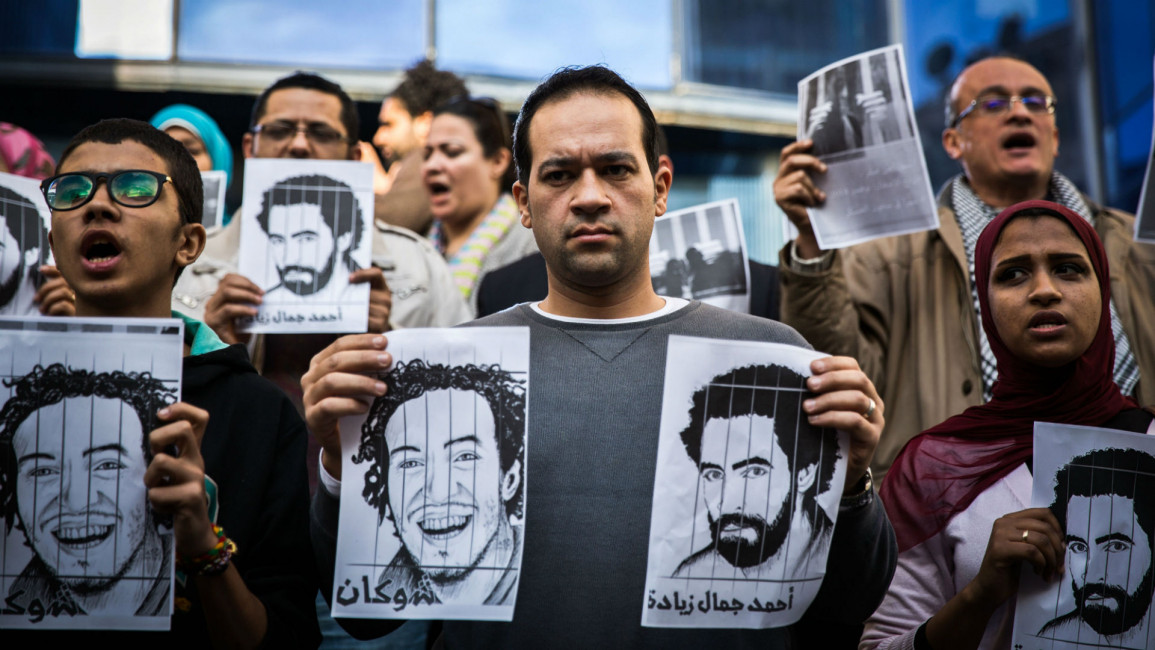
Meet the Middle East's 'press freedom predators'
Meet the Middle East's 'press freedom predators'
Middle Eastern leaders make up a large chunk of Reporters Without Borders' 'press freedom predators' list, but Israel escapes censure despite its bleak record.
3 min read
Egyptian protesters demand teh release of Shawkan and Ahmad Jamal Ziyadah [AFP]
Since the Arab uprisings of 2011, regimes across the Middle East have firmly tightened their grip on free expression and journalism.
With information, or indeed disinformation, playing such a crucial role in keeping dictatorial regimes in power, governments have targeted and harrassed reporters across the region.
It comes as no surprise then, that Arab leaders and groups make up a key section of Reporters Without Borders' list of 'press freedom predators'.
The list was published on November 2 to mark the International Day to End Impunity for Crimes against Journalists.
Posted on the freedom of information watchdog's website, the gallery is graced by the images of Egyptian President Abdel Fattah al-Sisi, Sudan's Omar al-Bashir, Saudi King Salman, Bahrain's King Hamed bin Isa al-Khalifa and Syria's Bashar al-Assad, among others.
Joining them on the list are the Islamic State group, who have managed to build their own media machine, and Yemen's Houthi rebels. Leaders with a large stake in the Middle East also feature, including Iran's Ali al-Khamanei and Turkish President Recep Tayyip Erdogan.
| Read more: Crimes against journalists: An epidemic of impunity |
For each of these names, there are thousands of activists and journalists who have been jailed, harrassed, beaten and in some cases even condemned to death for reporting.
 |
| Egypt's Abdel Fattah al-Sisi and Bahrain's Hamed bin Isa al-Khalifa made the list of 40 'press freedom predators' [Screenshot] |
Egyptian photo journalist Mahmoud Abu Zeid, better known as Shawkan, still languishes in jail and potentially faces the death penalty. Meanwhile, Saudi journalist Alaa Brinji is seeing out his five year sentence for tweeting about his country's laws that prohibit women from driving.
For Syria, the chaos that now envelops it is testament to Assad's bloody determination to control free speech and much more, while Bahrain's ongoing repression of opposition activists needs no exhaustive introduction.
Indeed, given the current state of control and repression in the Middle East, the list is hard to disagree with.
Curiously, Israel is omitted from the gallery, however, with Prime Minister Binyamin Netanyahu strangely swerving inclusion in the list of 40 'predators'.
Israel currently holds hundreds of Palestinians, including many journalists, under administrative detention, allowing the 'Middle East's only democracy' to hold them without charge or trial.
The occupier state has also targeted Palestinian journalists, hand-in-hand with Facebook, by targeting activists and having their accounts blocked. In some cases, this has even led to Palestinians, including children, being detained for their social media activity.
On top of this, Israel has targeted journalists during its destructive military campaigns against Palestinians. According to the United Nations, 15 journalists were killed during Israel's assault on Gaza in 2014.
Considering this, RWB's 'predator' list has excluded one of the region's biggest offenders when it comes to free reporting, while quite rightly shedding light on the crimes of others.


![Minnesota Tim Walz is working to court Muslim voters. [Getty]](/sites/default/files/styles/image_684x385/public/2169747529.jpeg?h=a5f2f23a&itok=b63Wif2V)




